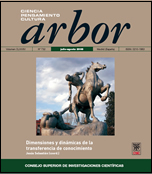The science works
DOI:
https://doi.org/10.3989/arbor.2008.i732.220Keywords:
Science, Technology, techno-science, 2nd Law of Thermodynamics, Atlan, Heidegger, Lévinas, unconditional, ethicsAbstract
This paper has the purpose of showing the identity between science and technology from within scientific language. The traditional philosophical argument in favour of this identity is briefly examined, through the work of Heidegger. Then, following Henri Atlan (“Ordres et Significations”, 1979. Le crystal et la fumée. Essai sur l’organisation du vivant. Paris: Éd. Du Seuil) the scientific definitions of order and disorder are reviewed; then Boltzmann’s statistical formulation of the Second Law of Thermodynamics is discussed, to show that such a law could only appear in the context of Modernity and the Industrial Revolution. In fact, the concept of “mechanical work” would be the “missing link” assimilating science to techno-science, to technology. The paper also discusses the consequences of such an assimilation, and the resistance with which it is usually received by the scientific community. This resistance arises from the loss of the unconditional character of scientific truth. The concept of the “unconditional”, its genealogy and ethic relevance within Modern philosophical thought, from Spinosa to Kant and Wittgenstein, are discussed. Finally, Emmanuel Lévinas’ Ethics is introduced: for Lévinas, in fact, the recovery of the unconditional character of the ethical (and also, of cognitive truth) requires that the dialogic character of all kind of statements be taken into account.
Downloads
References
Atlan, Henri (1979): Le cristal et la fumée. Essai sur l’organisation du vivant, Paris, Éd. Du Seuil.
Benjamin, Walter (1955): “Geschichtsphilosophische Thesen”, Schriften, Franfurt, M. Suhrkamp. Blumenberg. Hans (1966): Die Legitimität der Neuezeit, Franfurt, M. Suhrkamp.
Foucaut, Michel (1975): Surveiller et Punir, Paris, Gallimard.
Hacking, Ian (1975): The Emergence of Probability: a Philosophical Study of Early Ideas About Probability, Induction and Statistical Inference, Cambridge, Cambridge University Press.
Hacking, Ian (1990): The Taming of Chance (Ideas in Context), Cambridge, Cambridge University Press.
Heidegger, Martin (1927): Sein und Zeit. Jahrbuch für Philosopie und phänomenologische Forschung, vol. VII, pp. 1-438, Halle.
Heidegger, Martin, 1938 (1977): The Question Concerning Technology and Other Essays, William Lovitt (trans.), New York, Harper Torchbooks. Kant, Immanuel: Fundamentación de la Metafísica de las Costumbres.
Lévinas, Emmanuel (1963): Difficile Liberté. Essais sur le judaisme, Paris, Albin Michel.
Lévinas, Emmanuel (1992): Totalité et Infini, Paris, Kluwer Academic.
Nietzsche, Friedrich: Zur Genealogie der Moral. Eine Streitschrift.
Sabrovsky, Eduardo (2001): De lo Extraordinario, Nominalismo y Modernidad, Santiago de Chile, UDP-Cuarto Propio. Spinosa, Baruch: Ethica Ordine Geometrico Demonstrata.
Spinosa, Baruch: Tractatus Theologico-Politicus. Wittgenstein, Ludwig (1922): Tractatus Lógico-Philosophicus C. K. Odgen (trans.), London, Routledge.
Zupancic, Alenka (2000): The Ethics of the Real. Kant and Lacan, London, Verso.
Downloads
Published
How to Cite
Issue
Section
License
Copyright (c) 2008 Consejo Superior de Investigaciones Científicas (CSIC)

This work is licensed under a Creative Commons Attribution 4.0 International License.
© CSIC. Manuscripts published in both the printed and online versions of this Journal are the property of Consejo Superior de Investigaciones Científicas, and quoting this source is a requirement for any partial or full reproduction.All contents of this electronic edition, except where otherwise noted, are distributed under a “Creative Commons Attribution 4.0 International” (CC BY 4.0) License. You may read here the basic information and the legal text of the license. The indication of the CC BY 4.0 License must be expressly stated in this way when necessary.
Self-archiving in repositories, personal webpages or similar, of any version other than the published by the Editor, is not allowed.















